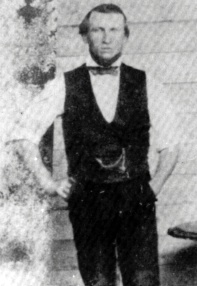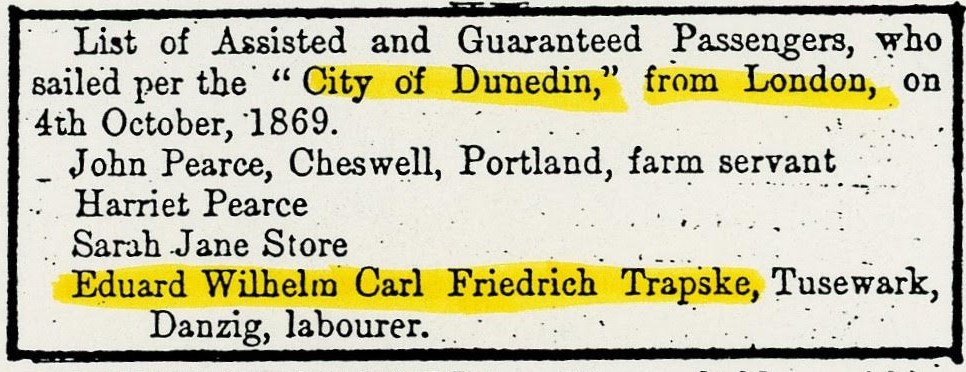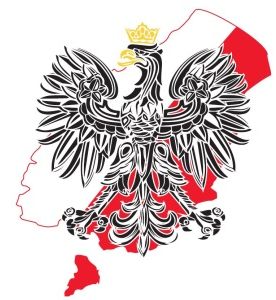Trąpski Family

click on name or picture to go to Trapski Family Tree at ancestry.com

Click ship to open the families ship page
In another tab
Spoken Polish
If you would like to hear the Polish names and text spoken in Polish then we can help.
Firstly click on this link "Text to Polish" and then copy the text you wish to hear, and paste it into the translation box. You can either listen to it or have it download onto your machine.
Enjoy !!
SURNAMES & THEIR ORIGINS
TRAPSKI possibly TRĄBSKI (Pol) trąba. Meaning: horn or trąbka – trumpet.

Frederick Ferdinand Trapski, courtesy of “Danzig to Dunedin”
Frederick Ferdinand Trąpski, (b. 1836–d. 1874) was the son of a tailor who was born on 4 May 1836 in a place called Tusewark in the region of Gdańsk. He made his way to New Zealand sometime in the early 1860s and married on 10 December 1864 at the catholic church of St. Joseph’s in Dunedin to Alice (Alicia) McKenna (b. 1834 at Monaghan, Ireland–d. 1883), the daughter of Charles McKenna. The family born at Owhiro (Allanton) were: Charles Henry (b. 1866–d. 1920), Frederick Ferdinand (b. 1868–d. 1946), Alice Alicia (b. 1870–d. 1929), and John (b. 1872–d. 1944). Frederick owned a small house and barn beside the railway and worked as a farmer in the district.
“EAST TAIERI. (From Our Own Correspondent) The continuous rain that fell without intermission from Tuesday evening up till Friday morning last, resulted in another flood. The water was to be seen on Thursday, extending its limits slowly but surely from the Silverstream, which was in high flood the previous day, as well as the Owhiro, and the several other creeks which were like small rivers. The Owhiro also spread itself over the land, but as the river rose it sent the water back again upon the plain which spread rapidly up the cut and into the lagoon, from which it had undisputed sway over the low-lying parts of the Plain, viz., from above the cut up to Brown’s, round by Anderson’s, Kirkland’s, Milne’s and several other farms near the lagoon, and up to the cross district road-line and the Taieri river. On the morning of Friday, it was all over the West Taieri as well, which looked as if all restraints of nature had been let loose, and the ocean had come upon us. The flood reached nearly as high or within six inches of the last flood of January last. The waters have, however, fallen very fast since Saturday morning, and are falling yet about eight inches in the twenty-four hours. On Sabbath, from seven o’clock in the morning till seven o’clock at night, it fell thirty inches, as measured from the end of one of the houses on Mr Anderson’s land. The settlers will this time be tremendous losers in grain and cattle. I also noticed a few cattle standing amongst the water, and that some of the farmers visited their farms in a boat and were gathering some of their cattle from the deep water to where it was of less depth. The fences also have suffered a little, and the ditches are washed nearly full of floating verbage, tussocks, &c. I also hear of a good few sheep being lost. A good many settlers have had their wheat sown, which will be wholly lost from the wet, as the seed will have perished; some have over sixty acres sown. All work will be stopped for a time. The water is in rollers, from the wind. All of the bridges are gone. I personally measured the water from the end of Mr Robert Ure’s house. It came up to F. Tropske’s, the other tenant of Mr Anderson, who has to-day removed his cattle from the water to the hill at the stable. I hear of two sections numbering 1 of 33, and 2 of 34, block I, Otakia district, on Scroggs’ hill being sold lately to Mr John Law, for the sum of Ll4O. It is nearly all fenced and partly improved, and some of it is in grass. It lies immediately behind the other property of Mr Law, on the top side of the road. The party who sold the land, containing about 150 acres, was Mr John Callander, one of the earliest settlers, being one of the Philip Laing’s passengers, then a lad.” Bruce Herald, 25 May 1870, p 5
In 1874, Frederick applied for 200 acres of section one in Block 13 at Waipahi. On 5 January 1874, before the family were about to move to Waipahi, Frederick was on his way to Dunedin to sign the papers when he was involved in a coaching accident at Lookout Point. He was sent to the Dunedin Hospital suffering from severe injuries with inflammation on the brain. As a result of the accident, Frederick was unable to work and support the family and suffered from fits of violence. He was finally admitted to the Dunedin Lunatic Asylum on 15 September 1874 suffering from acute melancholy.
“Steadman’s four-horse Waihola coach, driven by T. Aitken, met with an accident on Monday morning, when passing Lookout Point, the pole broke short, and the coach upset, the horses bolting with the front carriage, and dragging the driver for a short distance with them. He escaped, however, without injury, but some of the passengers of whom there were a good number received nasty bruises from the metal. William Mulligan had one of his wrists sprained; and Fred Trapske, a German, was conveyed to the hospital, being severely bruised, but having no bones broken. The other passengers were forwarded to Dunedin by a Caversham bus.” Otago Witness, 10 January 1874
“In the Resident Magistrate’s Court, Dunedin, a case is set down for hearing on the 22nd inst., having great interest to coach proprietors and travellers patronising them. The case referred to is that of Trapskie v. Steadman, in which the plaintiff seeks to recover the sum of L5O damages, for injuries received through an accident to one of the defendant’s coaches.” Evening Star, 8 May 1874, p 2
“RESIDENT MAGISTRATE’S COURT. Wednesday, June 3. {Before J. Bathgate, Esq., E.M.) Trapskey v. Steadman.—This was a claim for L5O, for injuries sustained by plaintiff by a coach accident on the 5th, January- Mr Stout for plaintiff and Mr Barton for defendant, who pleaded not guilty and all other possible pleas. —Mr Stout then stated the facts. He said that Mrs Steadman was the proprietress of a coach running between the Taieri and Dunedin. Plaintiff went in her coach on the day of the accident and paid his fare to the coachman. When the coach was going down an incline, the break being utterly useless, the coachman, in order to make up for the loss of it, went on the wrong side of the road so as to keep his wheels off the hard metal. Going down this way the coach struck a stone, by which the poles were broken,, causing the coach to upset, whereby plaintiff sustained severe injuries, If these facts were proved, he thought plaintiff was entitled to the full amount claimed, seeing he had not sued for his full loss occasioned by the accident.—Henry Tapsdey, the plaintiff, said that on the day in question he got into defendant’s coach at the Springbank Hotel on the East Taieri road. The coach was going to Dunedin, and he paid his fare to the driver. In coming down the hill from Lookout Point the coachman kept on the wrong, side of the road and went on to the soft ground, as his break was not good. In doing this he went into the gutter and the pole broke, the coach falling in two pieces—one part on the metalled road, the other part on witness. He had been unable to do any work since. When he spoke to Mrs Steadman about the matter, she charged him with the capsize. (Laughter).—By Mr Barton: As the coach upset, witness grasped the reins.—William Cooper, carpenter, said he repaired a coach owned by Mrs Steadman, after an accident in January last. Witness was a passenger by the coach on the day of the accident. Before this occurred, witness and another person tried to straighten the break so as to give it more power, but they were unable to make an impression on it. The coachman said it did not matter, as he was going to have it attended to when they got into town. The horses, just before the accident, were going at a slow pace,—John Stevens said he saw an accident at Look-out Point. He observed the right off wheel ‘of the coach get into a rut, then the wheel struck a stone, and so broke the pole. The coach went on for about eight yards, and then capsized. John Parnell, cabman, said he was sent for on the 5th January. He went to the scene of the accident, found the defendant lying on the road, and took him to the hospital.—William Wiley, carrier, said that he remembered the coach accident on the 5th January. He lifted the coach from off the plaintiff.—Mr Barton for the defence, said the circumstances of the accident were these: Before the accident took place the coach was going down the hill with a full load of passengers, and, as he would be able to prove, the driver was a most skillful and careful one. Besides Tapskey there were two other passengers on the box, and these would be able to corroborate the driver’s evidence. They were going down the hill slowly when the driver found out something must have happened. He beckoned to the waggoners to pull up on the other side of the road, his intention being to pull inside. The accident took place nearly opposite Mr Sibbald’s house where the coachman intended to have run the coach in order to repair it. So slowly was the coach going at the time that passengers were able to step out of it. Plaintiff caught hold of the reins below the driver, which caused the horses to become unmanageable. The horses turned round sharply, brought the coach round with them, the wheels became locked, hence the capsize. The accident was caused by plaintiff’s action.” Evening Star, 3 June 1874, p 2
“A case of considerable interest to coach owners, and others in the habit of travelling, was heard at the Resident Magistrate’s Court, to-day. The claim was for L5O, and was brought by one Tapskey against Mrs Steadman, owner of a coach running between the Taien and town, for injuries and loss of time sustained through an accident which occurred to her coach, of which he was a passenger, on January 5. The hearing of the case occupied a considerable time, and at its conclusion his Worship said he would take time to go through the evidence.” Evening Star, 3 June 1874, p 2
“RESIDENT MAGISTRATE’S COURT. Wednesday, June 10. (Before J. Bathgate, Esq., E.M.) CIVIL CASES. Trapskey v. Steadman.—ln this case, heard on Friday last, in which plaintiff was a passenger from the Taieri in a coach owned by defendant, and which met with an accident, by which plaintiff sustained severe injuries, and claimed L5O, his Worship now gave judgment as follows. This action has been instituted to recover damages for injury received through the overturn of the defendant’s coach, on which the plaintiff was a passenger. The evidence adduced proves that the break was not in proper working order; that the driver, to compensate for the defect in the power of the break, kept the coach running on the wrong side of the road with two wheels in the water table, and that while so running, one of the wheels came in contact with a large stone in the water-table, whereby the pole was broken and the horses frightened and rendered unmanageable. The consequence was an almost immediate upset, and the injury of the plaintiff. Although passenger carriers are only bound to carry safely those whom they take into their coaches as far as human care and foresight will go, yet they are responsible for any, even the slightest neglect. l am of opinion, that the defendant, in the circumstances, must be held liable for the damage caused by the overturn. The evidence as to the nature and extent of the injuries received by the plaintiff was not satisfactory. He was twelve days in the Hospital, and Dr Inglis subsequently attended him, yet no medical testimony was adduced. l am unable, therefore, to sustain his claim to the full amount. Judgment will be for the plaintiff for L3O, with costs. Mr Barton, for defendant, asked leave to appeal, which was granted, his Worship saying that there some very nice points to be decided.” Evening Star, 10 June 1874, p 2
“Our Taieri correspondent informs us that a man named Tropskey, who was injured in a coach accident in January last at Look-out Point, and who has not been able to work since, has been removed to the Benevolent Asylum. His wife and children are left in most distressing circumstances.” Otago Daily Times, 25 September 1874, p 2
“Some of the foreign residents in the Taieri are rather unfortunate. A Frenchman had to be sent to the lunatic asylum a few weeks ago, and last week a German named F. Tropski, had to be sent to the same place. It will be remembered he met with an accident through the upsetting of Mr Steadman’s coach, about six months ago, and although he had been in the hospital for several weeks, he never properly recovered the shock, and his ill-health and consequent inability to earn anything to support his family caused great depression in his spirits, which resulted in his insanity. According to the doctor’s opinion, his case is hopeless. We learn that a few of the gentlemen of the East Taieri are endeavouring to raise a subscription to aid his wife and four children, the eldest of whom is not eight years old. As he has been well-known in the district for over twelve years, we have no doubt the gentlemen will be successful”. Bruce Herald, 02 October 1874
Frederick died at the Dunedin Lunatic Asylum on 14 October 1874 aged 37 and is buried at the Southern Cemetery in Dunedin.
“The unfortunate German whose case of lunacy in the East Taieri we mentioned in a recent issue died in the Dunedin Asylum on Monday last.” Bruce Herald, 20 October 1874, p 5

The premises of John Trapski, Wheelwright and Blacksmith at Malta Street in Wyndham in 1907
Alicia and children moved to Waipahi anyway in the hope of making a better future for her family.
“One of the selectors in the deferred payment block at Waipahi, named Frederick Trapski, died soon after he took up his land, leaving a widow and four children very badly provided for, but the widow, with unusual pluck, determined to keep the 200-acre section, and try to put on the improvements required by law. She had some cows, so made butter and sold it, thus obtaining money to procure provisions and fence in the land, but when the three years were up, she had no land ploughed. The Waste Land Board decided that the ploughing must be done and granted her time to do it. She informed some of the neighbours of the circumstance, and a subscription was at once started, and sufficient money collected to plough the required twenty acres, and we are glad to state that the poor widow has now received the lease she has so well earned”. Clutha Leader, 27 July 1877, p 5
“Miscellaneous. Mr Clarke moved – “That the request of Mrs Trupskie for the remission of 30s rates for the current year be granted. Seconded by Mr Mosley, and carried.” Clutha Leader, 6 February 1880, p3
She is reputed to have repeatedly walked the three or four miles to Waipahi to put the butter on the train for sale in Gore. It was often said that the wandering animals were a bit of a problem due to the lack of fencing in the area. Aged only 49 years of age, she succumbed to cancer and died on 3 September 1883 and is buried in the Gore Cemetery. Edmund Hayes and Daniel Clarke were executors and guardians of the children then aged 17, 14, 13 and 11. The Cooper family in the same district brought up John, the youngest son. Alice, the only daughter at 12, took responsibility for looking after her older brothers.
“A Brave Struggle. — The Waipahi correspondent of the Tapanui Courier writes as follows: — While death has been making its ravages in all the districts around, we have hitherto escaped; but it appears we are not to pass scatheless. The victim is Mrs Trapski, one of one earliest settlers, who, after a lingering and painful illness of over four months, died on Wednesday night. Mr Trapski, it may be remembered, died from the effects of a coach accident on Saddle Hill shortly after taking up the ground, leaving a widow and four children almost unprovided for. The widow, anxious to secure a borne for the children and herself, determined to retain the deferred-payment section. For several years the struggle was a hard one; but she kept bravely on, aided by her two eldest boys, and she had the satisfaction of knowing that she had succeeded, as only a few weeks ago the last instalment of the money was paid, leaving the land their own; and, more than that, free of debt. Napoleon said: ” What France needs is good mothers.” But I am sure that, with mothers such as Mrs Trapski, New Zealand will most surely prosper.” Southland Times, 13 September 1883
“PROPERTY SALES. The Farmers’ Agency Company (Limited) reports having sold by auction, at Gore, on Tuesday, on account of the executors of the late Mr Trapskie, Waipahi, section 1, block XIII Waipahi survey district, and containing 200 acres at £3 per acre.” Otago Witness, 7 December 1893, p 24

Carse Head & Crichton Park Farms A story of the land and its people, the Trapski-Pullar family, by Margaret Pullar

From Otago Provincial Government Gazette 1869, p 355
Eduard Wilhelm Carl Frederick Trąpski, (b. 1839–d. 1914), younger brother of Frederick Ferdinand, arrived at Port Chalmers on 11 January 1870 aboard the City of Dunedin, which left London on 4 October 1869. In New Zealand, Eduard never married and worked as a carpenter.
ABOVE-KNEE AMPUTATION. Fitted from Measurements. Shag Valley Station, Waihemo, Otago, N. Z., July 10, 1884. You may be pleased to hear that Mr. Trapski is successfully using the leg you made for him and can walk easily and quickly. He has every reason to be grateful to you for the trouble taken in his case, and will, I’m sure readily recommend your firm to anyone suffering from a like misfortune. In this recommendation I shall gladly join. Frank D. Bell.
On 30 July 1890, he was institutionalised into the Otago Benevolent Institution at Caversham in Dunedin due to the loss of his leg, a resident of Waihemo. Eduard died at the Benevolent Institute at Caversham on 15 June 1914 aged 74 and is buried at the Andersons Bay Cemetery in Dunedin.

Frederick Trapski, Roman Catholic Block 29 Plot 25 at Southern Cemetery in Dunedin
References
Pobόg-Jaworowski, J. W, History of the Polish Settlers in New Zealand, ed. Warsaw; Chz “Ars Polonia.” 1990, pages 106 & 155.
Woods Betty, wrote family history, Danzig to Dunedin (One hundred and twenty-six years of the Trapski family in New Zealand (1864-1990).
Research Sources
Archives New Zealand Te Rua Mahara O Te Kawanatanga; Land Records.
Catholic Diocese of Dunedin, St Mary’s Church, Milton; Baptism Register.

Frederick Ferdinand Trapski, name plate at Southern Cemetery in Dunedin
Mary, Danzig to Dunedin (One hundred and twenty-six years of the Trapski family in New Zealand (1864-1990).
New Zealand Department of Internal Affairs Naturalisations, Births, Deaths and Marriages.
New Zealand Government Property Tax Department, from the rates assessment rolls, Return of Freeholders of New Zealand 1882, (1884).
Pullar Karen, for supplying family documents and information (2022)
Pullar Margaret, The Trapski-Pullar Family, Carse Head & Crichton Park Farms, A story of the land and its people (2013)
Trapski Graham, Danzig to Dunedin (One hundred and twenty six years of the Trapski family in New Zealand (1864-1990).
Websites
Andersons Bay Cemetery – Edward Trapske (1840-1914) – Dunedin City Council
Gore Cemetery – Alice Alicia Trapski (1834-1883) » Gore District Council (goredc.govt.nz)
Southern Cemetery – Frederick Trapski (1836-1874) – Dunedin City Council
Compiled by Paul Klemick (2022)
Chairperson ..... Ewa Rożecka Pollard
Phone ......+64 3 477 5552
Secretary ..... Anna McCreath Munro
Phone ..... +64 3 464 0053
Facebook ..... Poles Down South
Contact Poles Down South
Poles in New Zealand We would like to hear from Poles or people with any Polish connection, who visited New Zealand and particularly those of you who paid a visit or lived anywhere in Otago or Southland.
....................
Polski “Poles Down South” jest stroną internetową organizacji polonijnej w Nowej Zelandii działającej w rejonie Otago i Southland na Wyspie Południowej. Siedzibą organizacji jest Dunedin.


